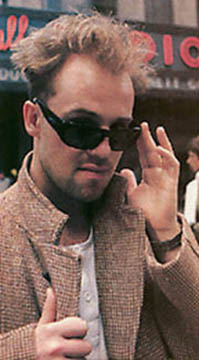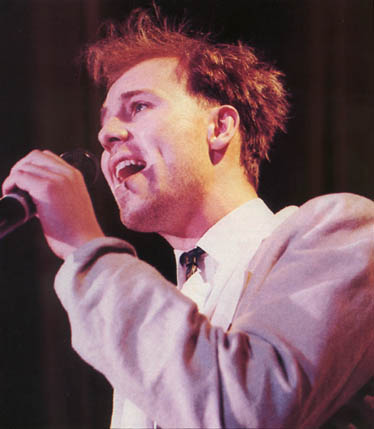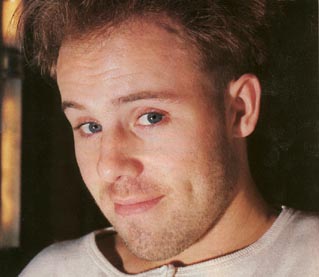|

|
|
Thomas Dolby 1984 |
|
Interview exerpts from Record Mirror April 1984 Photographs by Joe Shutter |
|

|
|
|
|
|
pop vs. cult status: "I'm much more of a cult follower than pop; people like Dan Hicks, Captain Beefheart, Robert Wyatt, XTC, Talking Heads, Television, Joni Mitchell... I like occasional pop hits but I suppose it loses its value once it's everywhere. I like things to be personal, my own little secret. "As far as writing obvious pop songs, I know it was a shock when the record company heard the new LP because the predictable thing would have been to record 'She Blinded me with Science' over and over again. They were... uh... concerned about the commerciality of The Flat Earth. I told them to get lost. "It's much better when stuff like 'Cloudburst' actually gets through to a smaller number of people but in a much deeper way. It's much better to build up some sort of following - it gives you much more opportunity to take chances." |

|
|
On Stage at Radio City Music Hall 1984
|
|
|
|
|
on his image as an English performer in America: "When lots of UK bands come over here they immediately start going 'Hey New York!' and hanging out in all the right clubs. I tend to go in the other direction and become even more English than I am. I feel like an expatriate Briton - David Niven in a Hollywood movie. It's important that I'm seen as being an import - from the outside - part of the old school. I don't think I'm lumped together with the UK invasion, I'm out on a limb. As the first solo performer I'm set apart. That early image was very much a part of my personality, I felt very distanced, very independent and very proud. Hence that isolated, loner image." |

|
|
links |
|
1984
- Thomas Dolby in Los Angeles, "The Flat Earth" US tour
continues
|
|
1985 -
Thomas Dolby with Ryuichi Sakamoto
|
|
1986
- Thomas Dolby, collaborations
with Joni Mitchell, work on film scores
|
|
1988
- Thomas Dolby, Mike Kapitan, "Aliens Ate My Buick" and the
Lost Toy People
|
|
1992
- Thomas Dolby, the making of "Astronauts and Heretics"
|
|
|
|
|
|
|